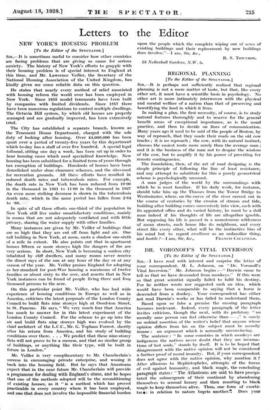REGIONAL PLANNING [To the Editor of the SPECTATOR.]
SIR,—It is perhaps not sufficiently realized that regional planning is not a mere matter of taste, but that, like every other art, it must have a scientific basis in psychology. No other art is more intimately interwoven with the physical and mental welfare of a nation than that of preserving and beautifying the land in which it lives.
In making a plan, the first necessity, of course, is to study natural features thoroughly and to reserve for the general benefit areas of exceptional importance, as is the usual practice, and then to decide on lines of communication. Many years ago it used to be said of the people of Boston, by way of reproach, that they made their roads on the old cow tracks ; it is no reproach ; the cow, with its natural instinct, chooses the easiest route more surely than the average man ; and it is the business of the man not to despise the wisdom of the cow, but to amplify it by his power of providing for remote contingencies.
The foundation, then, of the art of road designing is the simple principle of following the line of least resistance, and any attempt to substitute for this a purely geometrical scheme is psychologically unsound.
A man judges of the world by the surroundings with which he is most familiar. If his daily work, for instance, should take him up the Thames from the Tower Bridge to Westminster, where, on the curve of the river carved out in the course of centuries by the erosion of stream and tide, building after building comes successivelyinto view, each with its appointed office and its varied history, he must be a dull man indeed if his thoughts of life are altogether ignoble. But supposing his life is passed in a monotonous wilderness of mean streets, each house like its neighbour, and every street like every other, what will be the instinctive bias of his mind but to regard excellence as an unfamiliar thing,
































 Previous page
Previous page